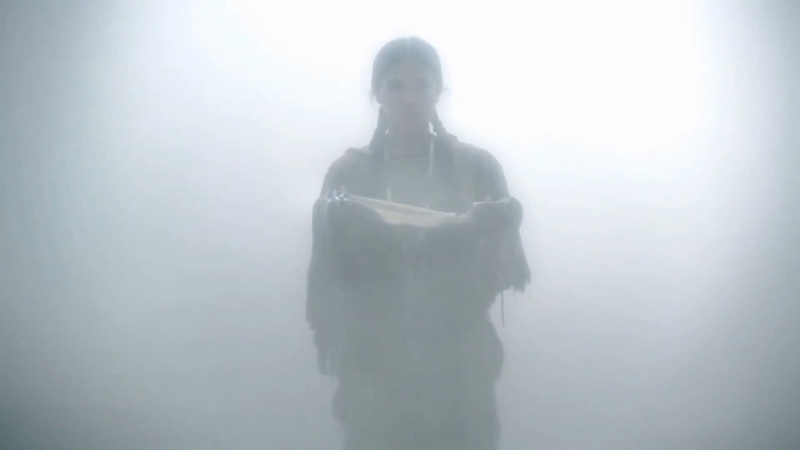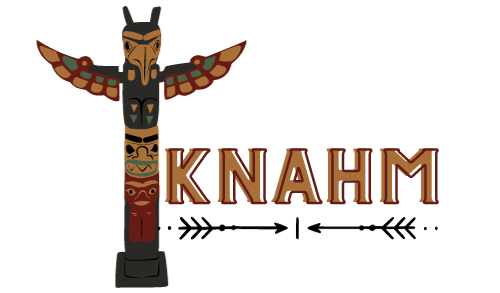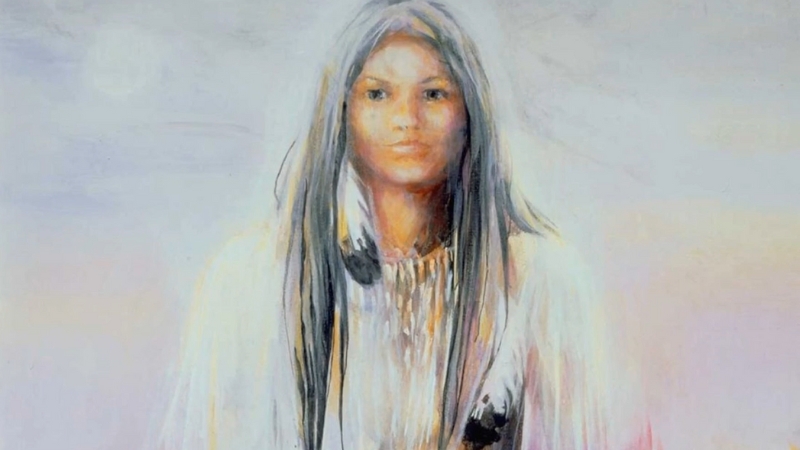Among the most revered stories of the Lakota people is that of Pte Ska Win – the White Buffalo Calf Woman. Her legend is not simply a myth told by firelight but a foundational truth within Lakota spirituality.
It tells of the moment when divine wisdom entered the human world to teach respect, ceremony, and the sacred connection between all living beings. Her teachings shaped the spiritual, moral, and cultural backbone of the Lakota, Dakota, and Nakota peoples, who still honor her today through ceremony and prayer.
The story of White Buffalo Calf Woman is not a relic of the past. It is alive in every smoke rising from a sacred pipe, every sunrise ceremony, and every song sung in gratitude to the Creator. It is a reminder that the balance between humans and nature is not a concept – it is a covenant.
The World Before Her Coming

Before she appeared, the Lakota faced hardship. The buffalo had disappeared, hunger spread, and the people drifted from their spiritual path.
Their connection to the Creator weakened, and their prayers felt lost to the wind. Two young scouts were sent across the Plains to search for food and guidance.
As they traveled, they saw something extraordinary – far in the distance, a figure floated toward them in a glowing mist. As she drew near, they realized she was not an ordinary woman.
Her hair was long and dark, her dress pure white, her steps silent across the prairie grass.
The Encounter: A Lesson in Reverence
The two scouts reacted differently to her sacred presence. One was filled with awe and lowered his eyes in respect. The other, driven by lust and arrogance, approached her with impure intent.
The woman raised her bundle and called on spiritual power. A sudden cloud enveloped the man. When it lifted, only his bones lay upon the ground.
The surviving scout fell to his knees. The woman told him to return to his people and prepare for her arrival.
She said she carried a sacred gift that would restore the Lakota to their spiritual path. The man ran back to camp, trembling but filled with hope.
The Arrival at the Village
When the White Buffalo Calf Woman arrived, the people saw her transform – first into a white buffalo calf, then into a radiant woman.
She held a bundle wrapped in buffalo hide, glowing with sacred energy. She told the people she came from Wakan Tanka, the Great Spirit, to bring them a sacred gift: the Čhaŋnúŋpa, the sacred pipe.
The people gathered in silence as she knelt in the center of the camp circle and began to teach.
The Gift of the Sacred Pipe
The Čhaŋnúŋpa symbolized the connection between the earth, the sky, and all living beings. White Buffalo Calf Woman explained how the pipe was to be used in prayer and ceremony.
The bowl represented the Earth; the stem represented everything that grows; the joining of the two represented the harmony between physical and spiritual life.
Symbol
Meaning
Teaching
Bowl (Stone)
The Earth, the feminine
The source of life and grounding
Stem (Wood)
The sky, the masculine
Growth, connection, and vitality
Smoke
Prayer carried upward
Communication with Wakan Tanka
Joining Bowl & Stem
Union of Earth and Sky
Balance between human and spirit
She said that when people smoked the pipe together, their hearts would become one, and their prayers would reach the Creator. She told them that each puff of smoke carried not just words but intention, gratitude, and harmony.
The Seven Sacred Ceremonies
White Buffalo Calf Woman stayed for four days, teaching the people how to live in spiritual balance.
She introduced seven sacred ceremonies that would guide the Lakota through life, each one a path to maintain balance and honor the sacred connection between the people, the land, and the Creator.
Ceremony (Lakota Name)
Purpose
Stage of Life / Meaning
Inípi (Purification Lodge)
Cleansing of body and spirit
Renewal and humility
Hanblečeya (Vision Quest)
Seeking spiritual guidance
Finding purpose and strength
Wi wanyang wacipi (Sun Dance)
Renewal of life and sacrifice
Connection to the Creator
Hunkapi (Making of Relatives)
Extending kinship and unity
Strengthening community
Ishna ta awi cha lowan (Preparing a Girl for Womanhood)
Honoring maturity and womanhood
Transition into adulthood
Tapa wanka yap (Throwing of the Ball)
Teaching balance and pursuit
Lessons in connection and play
Nagi gluhapi (Keeping of the Soul)
Honoring the departed
Continuity of spirit after death
Each ceremony had its place in the circle of life. They were not isolated rituals but living acts of relationship – with the self, with the people, with the land, and with the unseen world.
Her Departure and Transformation
View this post on Instagram
When her teachings were complete, White Buffalo Calf Woman told the Lakota that she must return to the spirit world.
She walked to the edge of the prairie, turned to face the people one last time, and said she would come back when the world needed her again.
As she walked away, she transformed – first into a black buffalo, then a red one, then a yellow one, and finally into a white buffalo calf before disappearing over the horizon. Each color represented a direction, a race, and a sacred truth.
Color of Buffalo
Direction
Meaning
Black
West
Introspection and strength
Red
North
Wisdom and sacrifice
Yellow
East
Enlightenment and new beginnings
White
South
Purity, peace, and renewal
Before she vanished, she promised that one day she would return as a sign of great renewal. Her people would recognize her arrival when a white buffalo calf was born.
The Prophecy and Its Fulfillment

For centuries, the Lakota remembered her promise. In 1994, a white buffalo calf named Miracle was born in Janesville, Wisconsin.
Elders from across tribes traveled to see her, calling it a sign that the sacred times were returning. Since then, more white buffalo births have been reported, each one seen as a reminder to live with respect for the sacred teachings she brought.
The Living Message: Balance, Purity, and Respect
The legend of White Buffalo Calf Woman continues to guide not only the Lakota but all who listen. Her teachings form a philosophy of balance and humility – recognizing that everything in the world has spirit and that every relationship is sacred.
Her message can be understood through three timeless principles:
Teaching
Core Message
Modern Relevance
Harmony with Nature
Humans are part of creation, not above it
Ecological awareness and sustainability
Sacred Reciprocity
All life exists in mutual exchange
Respecting the environment and community
Purity of Spirit
True prayer comes from intention and truth
Living with mindfulness and integrity
Continuity in Lakota Life Today
The ceremonies she gave are still practiced. The Inípi sweat lodge purifies body and mind; the Hanblečeya vision quest connects the seeker with spirit; and the Wi wanyang wacipi, or Sun Dance, renews the bond between Earth and people each year.
The sacred pipe remains central in prayer circles and gatherings.
Modern Lakota leaders often remind their communities that the return of the white buffalo calf is not a distant miracle but a call to action. It is a reminder to honor the old ways, to protect the land, and to live in peace with others.
Legacy and Reflection
@thelegendaryarchives Who is White Buffalo Calf Woman in Native American Folklore? #mythology #tiktok #fyp #fypシ゚viral #foryourpage #top #nativeamericanfolklore #nativeamericanmythology #mythological #mythicalcreature #nativeamerican #foryou #whitebuffalocalfwoman ♬ original sound – The Legendary Archives
The story of White Buffalo Calf Woman is not about mythology – it is about a relationship. She represents the bridge between human and spirit, matter and meaning, and her lessons continue to offer guidance in a time when the world faces imbalance.
Her promise endures: that renewal will come when people remember to live in gratitude and harmony once again. The Lakota say that when you smoke the pipe with pure intent, she is present. In that moment, the past and present merge, and her spirit breathes once more through the prayers of her people.
Closing Thought
The legend of White Buffalo Calf Woman reminds us that the sacred is not found only in temples or holy books but in every part of life – the wind, the soil, the breath, the shared silence between people.
Her story is both ancient and immediate, a call to see the world as a whole again.
As the Lakota say:
Mitákuye Oyás’iŋ — “All my relations.”
A reminder that all living things are one family.

